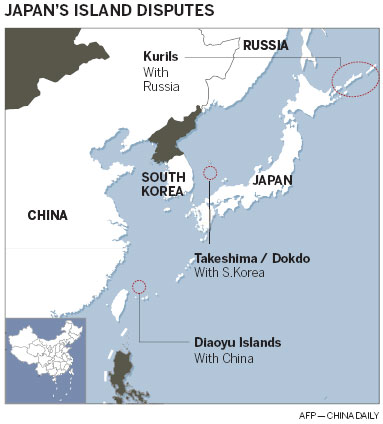Japan is mulling over breaking its diplomatic deadlock with its neighbors, yet a series of planned diplomatic reshuffles disclosed on Monday may not make a huge difference and its policy-makers may move closer to the conservative side, analysts say.
Japan's Kyodo News Agency quoted government sources as saying that Tokyo plans to replace its ambassadors to China, South Korea and the United States.
|
 |
Japanese vice-ministers of foreign affairs Shinichi Nishimiya and Koro Bessho will be appointed as ambassadors to China and South Korea, and Vice-Minister of foreign affairs Kenichiro Sasae will replace Ichiro Fujisaki as ambassador to the US.
The appointments are expected to be announced in early September, and Kyodo said the reshuffles are aimed at "restructuring Japan's diplomatic relations" amid a series of "wrangles", including territorial disputes with neighbors.
Within the past two months, Japan's ties with neighboring countries hit a low point amid frictions triggered by territorial issues.
In early July, Russian Prime Minister Dmitry Medvedev visited Kunashiri Island, one of the Russian-held islands also claimed by Japan, and he later showed indifference to Japan's angry response.
South Korean President Lee Myung-bak sparked protests in Japan last week when he visited the disputed islands that Seoul calls Dokdo and Tokyo calls Takeshima. The spats continued on Monday as Seoul unveiled a stone monument on one of the islands to "demonstrate sovereignty".
Chinese protesters landed on China's territorial Diaoyu Islands last week. Yet 10 Japanese rightists made a landing on Sunday to assert Japan's long-lasting rival claim over the islands, a move protested by both the Chinese government and general public.
Japanese Cabinet Secretary Osamu Fujimura expressed regret on Monday about the rightist landing, and Japanese Parliamentary Senior Vice-Minister of Foreign Affairs Tsuyoshi Yamaguchi is reportedly coming to Beijing this week to discuss the Diaoyu Islands issue.
Japan's leading Sankei Shimbun newspaper showed concerns in a commentary that the trio of China, South Korea and Russia is "surrounding Japan in a tight ring" with territorial issues.
Yet Huang Youfu, an expert on Korean studies at Minzu University of China in Beijing, rejected the notion as "inappropriate" and said Japan's island disputes with the three countries originate from separate historical contexts.
The ruling Democratic Party of Japan has long advocated for its policy of "ending the conventional bureaucrat-led style of governance" in deploying diplomats, yet its deadlocked ties with neighbors prompted the mulled reshuffles, a sign of Tokyo's foreign policy-makers' return to conservatism, analysts said.
Lu Yaodong, a researcher at the Institute of Japanese Studies at the Chinese Academy of Social Sciences, called the replacement of ambassadors "an obvious signal of policy change".
The right-wing forces are gathering momentum in Japan amid the country's economic stagnation, and experts warned of some Japanese politicians' nationalist words and actions are attempts to bluff voters for support.
"The rightist forces have mounted pressure on the Japanese government, and the rising tides of nationalistic moods have prompted cabinet members to make needed remarks on diplomatic arenas," Lu said in regard to the impending election in Japan.
Historical issues account for a major portion of Japan's frequent feuds with its neighbors, as memories of Japan's wartime aggression in the first half of the 20th century led to its neighbors' resentment toward its militarist past.
Japan is also accused of turning a blind eye to the demands to resolve the issue of forcing Chinese and Korean women into sexual slavery for Japanese troops during World War II.
"The national feelings behind the historical issues are a major driving force escalating bilateral feuds and should be given consideration," Huang Youfu said.
Seoul decided in late June to delay the signing of the General Security of Military Information Agreement, its first military pact with Tokyo, as Lee Myung-bak's governing party feared being labeled "pro-Japanese" by its domestic public.
Lu Yaodong said the crucial factor behind Japan's current diplomatic deadlock is its government's stance on the historical issues, including the territorial issues, and it may not see ties with neighbors improve "if it keeps playing tough on all fronts".
Meanwhile, the diplomat reshuffle signals Tokyo's plan to end its drifting policy emphasis in the region and stick more closely to the US-Japan alliance, experts said.
"Tokyo cannot get rid of its political dependence on Washington, and Washington has chosen Tokyo as its most needed ally in the region to help its pivot to Asia, as shown in the latest joint statement of Washington and Tokyo," Lu said.
And Washington will naturally mediate tension between Tokyo and its neighbors, experts said.
The US is not expecting bilateral frictions between Seoul and Tokyo, which are sparked by territorial and historical issues, to "impact the country's strategic deployment in the Asia-Pacific region", said Yuan Peng, an expert of American studies at the China Institutes of Contemporary International Relations.
As for the future, experts said frictions may be more frequent between Japan and its neighbors, and Tokyo has planned to lodge the islands case against Seoul with the International Court of Justice, a move Seoul has refused to respond to.
Japan's leading Asahi Shimbun said Tokyo may show more toughness toward China in response to "China's rapid rise", as China has surpassed Japan to become the world's second-largest economy.
As the latest episode in Tokyo Governor Shintaro Ishihara's farcical plan to "buy" the Diaoyu Islands, on Monday, Japan required the Tokyo prefectural government to "make some changes" in the application document for landing on the islands for land survey, a move analysts say may spark Beijing's further protest.